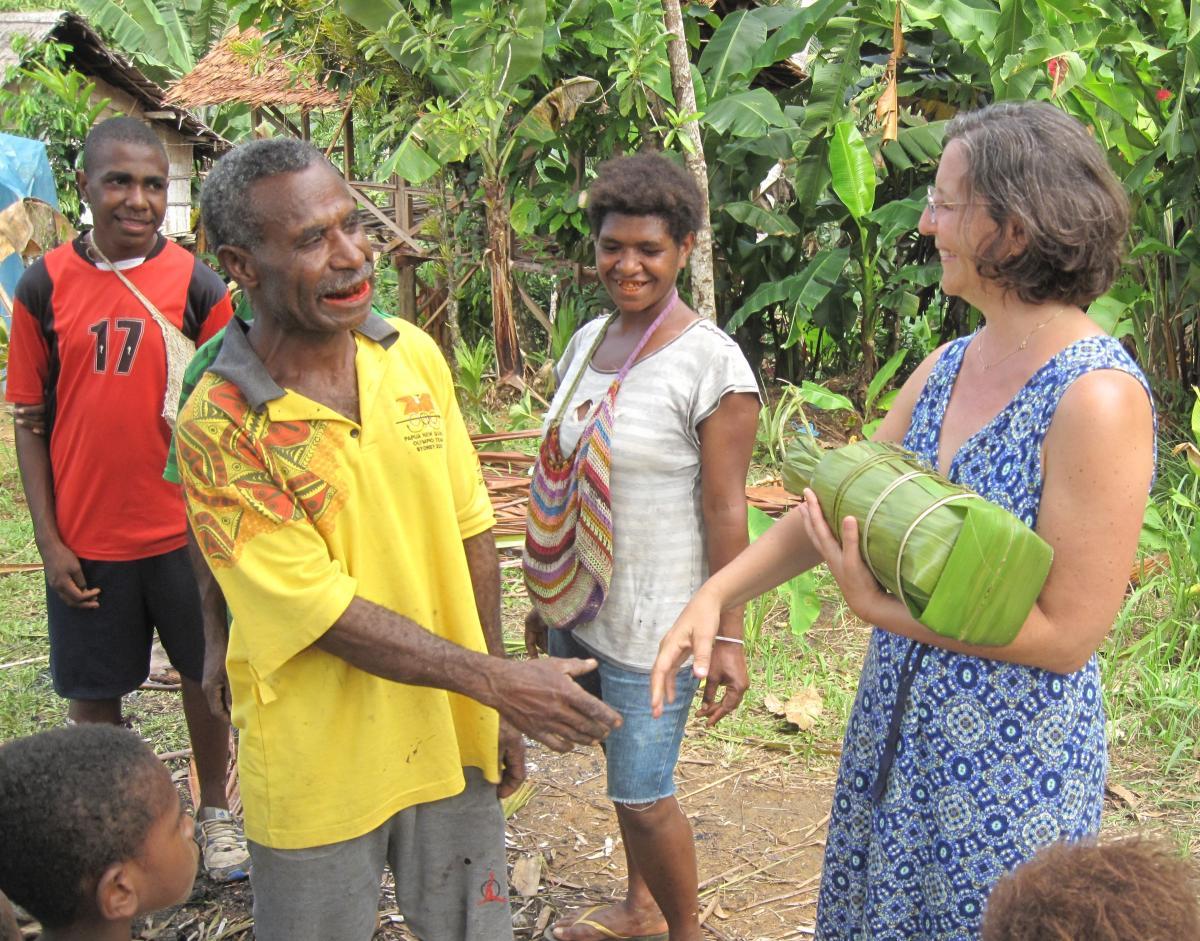
Lise Dobrin
Ph.D. in Linguistics, University of Chicago 1999
Accepting advisees
Specialties
Language sound and word structure; Arapesh languages (Papuan); Melanesian culture; history of anthropology; linguistic field methods; ethnography of language shift, documentation, and description.

My research on the Arapesh languages of Papua New Guinea began with my dissertation in linguistics. Working from documentary sources and materials collected during fifteen months of fieldwork (1997-1999), I studied the ways in which sounds are systematically exploited in Arapesh noun classification. The theoretical emphasis of this work, developed in my 2012 book Concreteness in Grammar: The Noun Class Systems of the Arapesh Languages, is on the nature of the lexical representations implied by the Arapesh noun classification systems. I argue that phonology and syntax can interact more freely than has traditionally been assumed.
Like many other small languages the world over, Arapesh is endangered. In the coastal Arapesh area, young adults have only passive competence in the language, and their children have hardly any knowledge of their ancestral tongue at all. Arapesh villagers instead use PNG’s creole lingua franca, Tok Pisin, as the medium of daily life. I discuss the cultural basis for Arapesh language shift in Dobrin 2014 and Kulick and Dobrin in press. Recognizing the extent to which linguistic and cultural change is happening in Arapesh communities has had a profound impact on the work that I do.

Most directly, I have become engaged in language documentation and description. In collaboration with UVA's Institute for Advanced Technology in the Humanities, and with support from the NSF/NEH Documenting Endangered Languages program, I created the Arapesh Grammar and Digital Language Archive, an archive of Arapesh linguistic and cultural materials. The archive incorporates dozens of Arapesh audiorecorded and transcribed texts that I continue to integrate with a lexicon, and I developed a transcript player to play the synchronized video/audio and text online (Dobrin and Ross 2017). I am also working to preserve a set of Bukiyip Arapesh texts that were collected by the missionary linguist Robert Conrad in the 1970s. I am currently working on a digital edition the History of Wautogik Village, a project that is meant to serve both scholarly and community goals. The History of Wautogik Village was written in English by Arapesh lawyer, philosopher, and statesman Bernard Mullu Narokobi (1943-2010) in order to preserve knowledge about his people and their culture and history. My effort to publish the manuscript forms part of a wider project to understand and disseminate the work of this important indigenous thinker and author (Dobrin 2020; Dobrin and Golub 2020).

Responding to language endangerment has brought new attention to social process within the discipline of linguistics. Revaluing the human and moral dimensions of linguistics has raised a number of issues surrounding power, ethics, research methods, and goals. In a series of papers (Dobrin 2008; Dobrin, Austin, and Nathan 2009; Dobrin 2009; Dobrin 2012; Dobrin and Holton 2014; Dobrin and Schwartz 2016b; Dobrin and Sicoli 2018; Dobrin 2021; Dobrin and Schwartz 2021) I try to bring an ethnographic sensibility to bear on some of these issues. The ethics of field research has also been an important focus of my scholarly service through my role in the University of Virginia’s Social and Behavioral Sciences Institutional Review Board, the American Anthropological Association ethics programs, the Linguistic Society of America’s Ethics Committee and Committee on Endangered Languages and their Preservation, and the UVA Anthropology Department's Fieldwork, Ethics, and Ethnographic Writing Workshop (Dobrin 2025). I further support discussion of these topics as editor of the journal Language Documentation and Description.
The cross-cultural fieldwork encounter is a key arena in which problems of social process are consequential, whether one is describing culture or documenting language. My field experience has provided me with a vantage point from which to revisit the publications and unpublished archive of two scholars who conducted research on Arapesh language and culture before me, Reo Fortune and Margaret Mead. Mead and Fortune did fieldwork on Arapesh together, yet they drew radically different conclusions from their experiences. In collaboration with Ira Bashkow (Dobrin and Bashkow 2006, Bashkow and Dobrin 2007, Dobrin and Bashkow 2010a,b), I have explored the interpersonal and intercultural factors that led to this divergence of interpretation, and sought to understand what this case means for the creation of knowledge about other social worlds.
Selected Publications
Please contact me to request any of my publications that you are unable to access from the links below.
In press. What Arapesh Dogs Mean: The Figure of the Talking Dog on New Guinea’s Sepik Coast. In Roger Lohmann (ed.), Dogs and their Humans in the Pacific. Routledge.
In press (with Don Kulick). Rampant Language Shift in Papua New Guinea. In Nicholas Evans and Sebastian Fedden (eds.), Oxford Guide to Papuan Languages.
2025. Training for Ethical Linguistics: A Model for Building “Responsible Conduct of Research” into Department Culture. Linguistics 63: 1–20.
2021 (with Saul Schwartz). The Social Lives of Linguistic Legacy Materials. Introduction to special issue of Language Documentation and Description 21:1–36.
2021. The Arapesh Suitcase Miracle: The Interpretive Value of Reproducible Research. Language Documentation and Description 21:37–69.
2020. Missionization and Language. In James Stanlaw (ed.), The International Encyclopedia of Linguistic Anthropology. Wiley and Sons, Inc.
2020. A ‘Nation of Villages’ and a Village ‘Nation State’: The Arapesh Model for Bernard Narokobi’s Melanesian Way. The Journal of Pacific History 55(2):165–186.
2020 (with Alex Golub). The Legacy of Bernard Narokobi and the Melanesian Way. Introduction to special issue of The Journal of Pacific History 55(2):149–164.
2018 (with Mark Sicoli). Why Cultural Meanings Matter in Endangered Language Research. In Bradley McDonnell, Andrea L. Berez-Kroeker & Gary Holton (eds.), Reflections on Language Documentation 20 Years after Himmelmann 1998. Language Documentation & Conservation Special Publication No. 15, pp. 41–54.
2017 (with Douglas Ross). The IATH ELAN Text-Sync Tool: A Simple System for Mobilizing ELAN Transcripts On- or Off-Line. Language Documentation & Conservation 11:94–102. Publication of transcript player on associated website: http://community.village.virginia.edu/etst/.
2016b (with Saul Schwartz) - Collaboration or Participant Observation? Rethinking Models of 'Linguistic Social Work'. Language Documentation and Conservation 10:253-277.
2016b (with Saul Schwartz) - The Cultures of Native North American Language Documentation and Revitalization. Reviews in Anthropology 45(2):88-123.
2014 - Language Shift in an ‘Importing Culture’: The Cultural Logic of the Arapesh Roads. In Peter K. Austin and Julia Sallabank, eds., Endangered Languages: Beliefs and Ideologies in Language Documentation and Revitalization, pp. 125-148. Proceedings of the British Academy 199. London: Oxford University Press.
2013 (with Gary Holton) - The Documentation Lives a Life of Its Own: The Temporal Transformation of Two Endangered Language Archive Projects. Museum Anthropology Review 7(1-2):140-154
2012 - Concreteness in Grammar: The Noun Class Systems of the Arapesh Languages. Stanford Studies in Morphology and the Lexicon. Stanford: CSLI.
2012 – Ethnopoetic Analysis as a Methodological Resource for Endangered Language Linguistics: The Social Production of an Arapesh Text. Anthropological Linguistics 54(1):1-32.
2011 (with Josh Berson) - Speakers and Language Documentation. In Peter K. Austin and Julia Sallabank, eds., The Cambridge Handbook of Endangered Languages, pp. 187-211. Cambridge: Cambridge University Press.
2010a (with Ira Bashkow) - Arapesh Warfare: Reo Fortune's Veiled Critique of Margaret Mead's Sex and Temperament. American Anthropologist 112(3):370-383.
2010b (with Ira Bashkow) - The Truth in Anthropology Does Not Travel First Class: Reo Fortune's Fateful Encounter with Margaret Mead. In R. Darnell and F. Gleach, eds., Histories of Anthropology Annual Volume 6, pp. 66-128. Lincoln, NE: University of Nebraska Press.
2009 (with Peter K. Austin and David Nathan) - Dying to Be Counted: The Commodification of Endangered Languages in Documentary Linguistics. In Peter K. Austin, ed., Language Documentation and Description, Vol. 6, pp. 37-52. London: Hans Rausing Endangered Languages Project.
2009 - Introduction to special section of Language: SIL International and the Disciplinary Culture of Linguistics. Language 85(3):618-619.
2009 (with Jeff Good) - Practical Language Development: Whose Mission? Language 85(3):619-629.
2008 - From Linguistic Elicitation to Eliciting the Linguist: Lessons in Community Empowerment from Melanesia. Language 84(2):300-324.
2007 - The Historical Study of Ethnographic Fieldwork: Margaret Mead and Reo Fortune among the Mountain Arapesh. History of Anthropology Newsletter 34(1):9-16.
2006 (with Ira Bashkow) - 'Pigs for Dance Songs': Reo Fortune's Empathetic Ethnography of the Arapesh Roads. In R. Darnell and F. Gleach, eds., Histories of Anthropology Annual Volume 2, pp. 123-154. Lincoln, NE: University of Nebraska Press.
2001 - Arapesh. In J. Garry and C. Rubino, eds., Facts About the World's Languages: An Encyclopedia of the World's Languages, Past and Present, pp. 33-38. New York: Wilson.
1998 - The Morphosyntactic Reality of Phonological Form. In G. Booij and J. van Marle, eds., Yearbook of Morphology 1997, pp. 59-81. Dordrecht: Kluwer.

